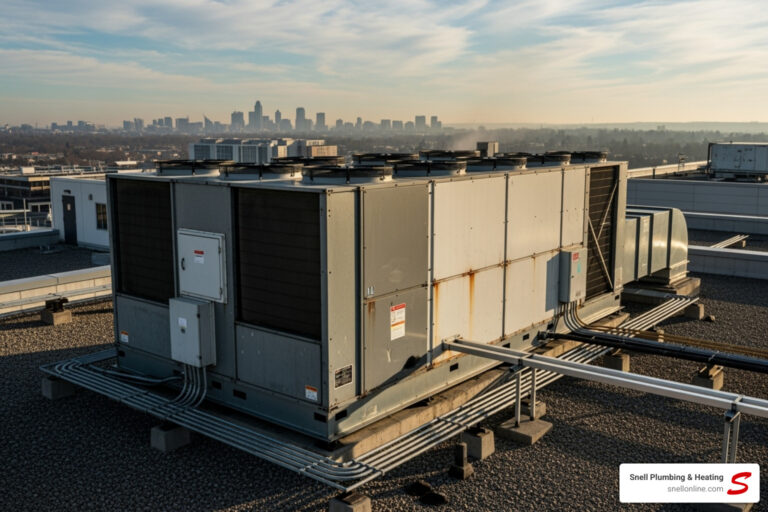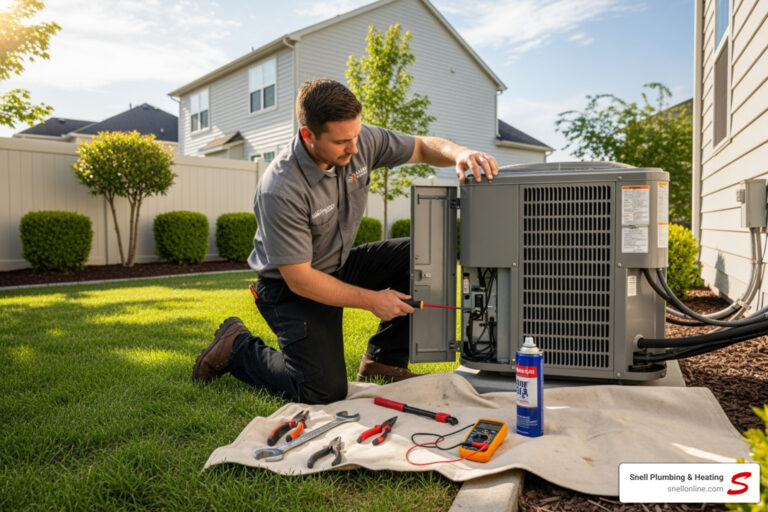Summer in Springfield places a heavy demand on home cooling systems. As temperatures climb, many homeowners count on their AC units to keep things comfortable indoors. Just like any piece of equipment that works hard day after day, your AC system can wear down over time. One of the earliest problems that tends to sneak up without warning is low refrigerant levels.
Refrigerant plays a key role in cooling your air. When it starts to leak or runs low, your AC doesn’t just work less efficiently — it may start showing signs that something more serious is wrong. Catching those early signs can make all the difference. It gives you the chance to stop the issue before it leads to major damage and a big repair bill.
Recognizing Common Indicators of Refrigerant Loss
Refrigerant loss happens slowly in many cases. Because of that, most people don’t realize their system is having trouble until the cooling function is noticeably off. But if you know what to listen and look for, the signs of refrigerant issues show up earlier than expected.
Here are a few common indicators to pay attention to:
– Hissing or bubbling sounds near the AC system: These noises could point to a leak in the refrigerant line. Hissing suggests a moderate leak, while bubbling can mean refrigerant is escaping from a low-pressure area.
– Ice forming on the refrigerant line or evaporator coil: If these parts are frosting over, there’s a good chance your system doesn’t have enough refrigerant for proper function. Ice may first show up on the outdoor line, then begin to restrict indoor performance.
– Warm air blowing from the vents: One of the first things homeowners in Springfield notice during refrigerant loss is a steady stream of air coming through the vents that just doesn’t feel cold anymore. Even if the AC is running constantly, it fails to cool the space effectively.
– Longer run times with less cooling: When your AC starts taking longer to cool the home but never quite gets there, it could be struggling due to a lack of refrigerant cycling through the system.
– Humidity levels feel higher indoors: Refrigerant helps your AC remove humidity. When it’s low, the air may feel sticky or less comfortable, especially on hot days.
An example many residents can relate to: you return home from work, and although the AC has been running for hours, the house still feels warm and the air coming from the vents is weak. Instead of assuming the unit is just old or underpowered, it’s worth looking closer. These small issues can be warning signs of refrigerant trouble.
Visual Signs to Look For
In addition to performance changes, you can sometimes spot refrigerant problems by simply inspecting parts of the system. A quick visual check may reveal physical signs that something isn’t right.
Keep an eye out for these clues:
– Oily residue around joints or connections: When refrigerant leaks, it often mixes with oil inside the system and leaves a visible stain near service ports, valves, or refrigerant lines.
– Rust around copper lines or on coils: Corrosion may show up where a leak is present, especially around the outdoor unit. It can point to moisture and refrigerant escaping at the same spot.
– Damaged insulation on refrigerant lines: Refrigerant lines are usually wrapped in a protective material. If that wrapping is wet, cracked, or visibly worn, it can let refrigerant escape more easily.
– Low airflow from vents: Walk from room to room and compare air movement. A sharp drop in airflow in one or more areas could be a sign an AC system with refrigerant problems is having trouble circulating air.
While some of these symptoms could also stem from other AC issues, seeing a few of them at once is a strong indication of a refrigerant issue. Ignoring these signs often leads to larger system failures, especially during heat waves, when your AC is already working at maximum capacity. If something looks or feels off, it’s worth having it checked by our professionals before the damage worsens.
Impact Of Refrigerant Loss On Your AC System
When refrigerant levels drop, your AC system can’t function as designed. The compressor, which is one of the main parts that circulates refrigerant, has to work harder to try and meet the temperature setting. This extra strain increases wear and can eventually lead to a full breakdown. Compressors are expensive to replace, and in some cases, when they’re damaged, the whole system may need to be replaced.
Another issue you’ll likely notice is higher energy bills. A system that’s low on refrigerant won’t cool your home efficiently, which means longer run times and more power usage. It might seem like a small amount of extra use over time, but left unchecked, this can result in steady increases that eat into your budget and leave your home less comfortable.
If refrigerant loss continues for weeks or months, the performance decline spreads across the system. Coils can freeze and crack, parts may corrode, and fans may overheat. All of this adds up to widespread damage that’s much more expensive to address than a basic refill or leak repair. That’s why early detection and response are so important. Many Springfield homeowners overlook refrigerant problems until they’re dealing with full system failure during the hottest part of the season.
When To Call Our Professionals For AC Repair In Springfield
Once you’ve noticed changes in airflow, cooling, or seen visual signs near your AC unit, waiting any longer puts your system at risk. A refrigerant issue doesn’t resolve on its own. Whether it’s a small leak or a major breach, it takes the right equipment and knowledge to detect the exact cause and correct it without further damage.
Here’s what to expect when scheduling an appointment for AC repair in Springfield:
1. Our technicians perform a detailed system check, including pressure measurements and visual inspections.
2. If a leak is present, we locate its exact position using approved detection tools.
3. After securing and sealing the leak source, the system is recharged to manufacturer specifications.
4. We test overall performance, adjust settings if needed, and ensure the system is running safely and efficiently.
Springfield homeowners should avoid topping off refrigerant on their own or ignoring symptoms just because cold air is still coming out. Many times, the unit can still run but in a damaged or strained condition. That leads to bigger problems when outdoor temperatures hit extreme highs and your system can’t keep up. You rely on your AC when it matters most, so a delay in handling low refrigerant risks serious discomfort just when you need performance to be steady.
Keep Your AC Running Smoothly
Refrigerant levels don’t go low unless something is wrong. Even minor leaks will lead to performance problems if not taken care of early. Keeping your home comfortable in Springfield’s summer heat depends on catching these signs before the system overloads or shuts off entirely.
Staying ahead of refrigerant issues means watching for changes in cooling, being alert for strange noises or visible damage, and taking prompt action when symptoms show up. Regular inspections from trained professionals can also prevent problems from forming in the first place. An ongoing checkup schedule keeps your AC efficient, reduces the need for emergency visits, and helps your system last longer.
Maintaining cooling comfort through the hottest months takes attention and fast response. If your Springfield home’s AC system isn’t keeping up or showing signs of refrigerant trouble, don’t wait for it to get worse. Early response gives you the best chance of solving the problem with less cost, less stress, and more peace of mind during the summer.
If you notice your AC struggling to keep your home cool and suspect refrigerant issues, prompt attention through reliable AC repair in Springfield can help prevent costly damage and restore your system’s efficiency. Snell Plumbing & Heating has helped countless homeowners maintain dependable performance through the toughest months. For a quick estimate or to book a service visit, please contact us today.





